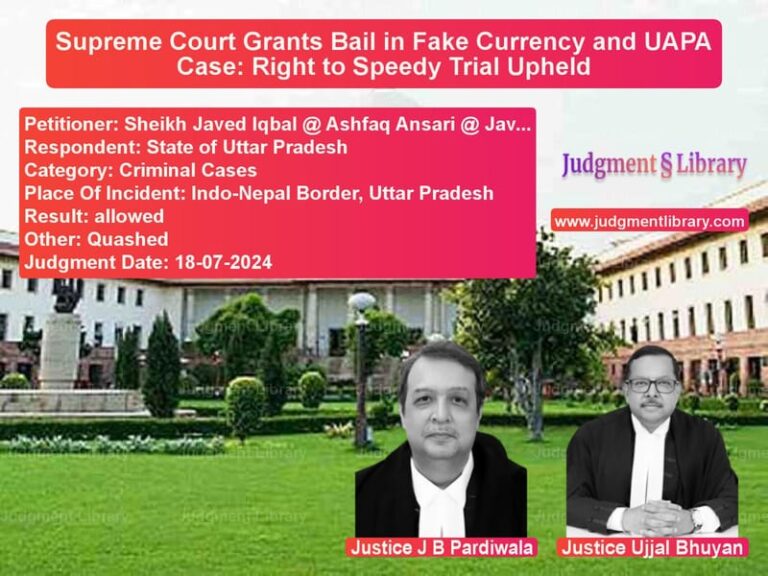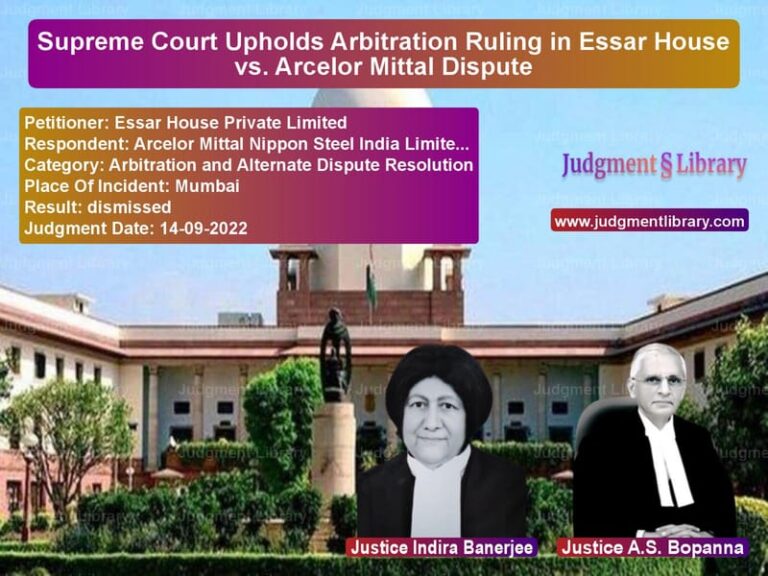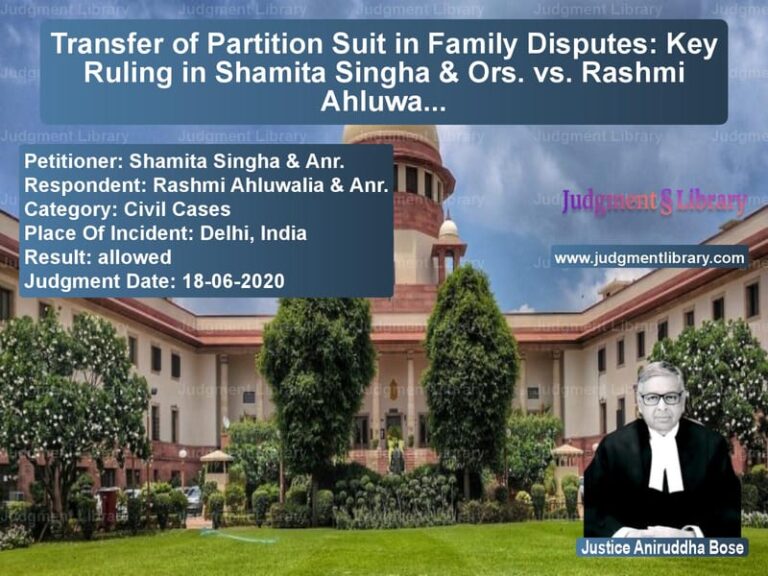V. Sejappa vs. State: Supreme Court Acquits Public Servant in Corruption Case
The Supreme Court of India, in its judgment dated April 12, 2016, ruled in favor of the appellant in the case of V. Sejappa vs. The State by Police Inspector Lokayukta, Chitradurga. The case revolved around allegations of bribery and corruption under the Prevention of Corruption Act, 1988. The Supreme Court overturned the conviction imposed by the Karnataka High Court and restored the trial court’s order of acquittal.
Background of the Case
The case originated from a complaint filed against the appellant, V. Sejappa, who was working as an Assistant Executive Engineer in the Well Boring Sub-Division of the Public Health Engineering Department, Chitradurga. The complainant, N. Ramakrishnappa, a retired Special Grade Junior Engineer, alleged that the appellant demanded a bribe of Rs. 5,000 in exchange for issuing a ‘No Objection Certificate’ (NOC) required for processing his pension benefits.
The Lokayukta police registered an FIR and conducted a trap operation on December 17, 1997. The appellant was allegedly caught red-handed accepting the bribe, leading to his prosecution under Sections 7 and 13(1)(d) read with Section 13(2) of the Prevention of Corruption Act.
Trial Court’s Decision
The trial court, after examining the evidence and testimonies, held that the prosecution failed to prove the essential elements of the crime, namely:
- The demand for a bribe.
- The acceptance of illegal gratification.
- A valid sanction for prosecution.
The court found discrepancies in the prosecution’s case, including inconsistencies in witness testimonies. As a result, the appellant was acquitted.
High Court’s Ruling
The Karnataka High Court overturned the acquittal and convicted the appellant, ruling that the prosecution had sufficiently proved the demand and acceptance of the bribe. The High Court sentenced the appellant to:
- Six months of imprisonment under Section 7 of the Prevention of Corruption Act.
- Two years of imprisonment under Section 13(1)(d) read with Section 13(2) of the Act.
- Both sentences were to run concurrently.
Arguments by the Appellant
- The appellant’s counsel argued that the High Court failed to consider the defense of alibi, as he was not present at his office in Chitradurga from December 7, 1997, to December 10, 1997.
- The appellant attended a seminar in Bangalore and took delivery of a government vehicle on December 10, 1997, which corroborated his claim that he was not in Chitradurga on the date of the alleged demand.
- Witnesses from the prosecution, including PW-2, contradicted the prosecution’s version by stating that the money was not a bribe but a repayment of a loan taken by the complainant for purchasing diesel.
Arguments by the Respondent
- The State contended that the appellant demanded and accepted the bribe to facilitate the issuance of the NOC.
- The trap operation was successfully conducted, proving the acceptance of the tainted money.
- The prosecution relied on the presumption under Section 20 of the Prevention of Corruption Act, which shifts the burden on the accused to prove that the money was not accepted as illegal gratification.
Supreme Court’s Observations
The Supreme Court analyzed the case and made the following observations:
- The absence of proof of demand for illegal gratification was a fatal flaw in the prosecution’s case.
- The trial court had correctly evaluated the evidence and reached a reasonable conclusion that there was no demand or acceptance of bribe.
- The defense of alibi was substantiated by official records, indicating that the appellant was in Bangalore during the crucial period.
- PW-2’s testimony supported the appellant’s claim that the money was not a bribe but a repayment of a prior loan.
- The High Court erred in overturning the acquittal without identifying any perverse findings in the trial court’s judgment.
Supreme Court’s Ruling
The Supreme Court allowed the appeal and passed the following orders:
- The conviction and sentence imposed by the High Court were set aside.
- The acquittal order passed by the trial court was restored.
- The appellant’s bail bonds were discharged.
Key Takeaways from the Judgment
- Presumption under Section 20: The Supreme Court reaffirmed that presumption of guilt under the Prevention of Corruption Act applies only when demand for a bribe is proved.
- High Burden of Proof: Mere recovery of tainted money does not automatically establish an offense unless corroborated with evidence of demand and acceptance.
- Protection of Public Servants: The ruling safeguards public servants from frivolous corruption charges by ensuring fair trial principles.
- Standard for Interference in Acquittals: The court reiterated that appellate courts should not overturn acquittals unless the trial court’s findings are perverse or wholly unsustainable.
Conclusion
The Supreme Court’s ruling in V. Sejappa vs. State reaffirms essential principles in corruption cases under the Prevention of Corruption Act. By restoring the acquittal, the court upheld the necessity of proving both demand and acceptance of bribes beyond reasonable doubt. This judgment sets a precedent for similar cases, ensuring that mere recovery of money is not sufficient to convict an accused under anti-corruption laws.
Don’t miss out on the full details! Download the complete judgment in PDF format below and gain valuable insights instantly!
Download Judgment: V. Sejappa vs State by Police Insp Supreme Court of India Judgment Dated 12-04-2016-1741854685760.pdf
Direct Downlaod Judgment: Direct downlaod this Judgment
See all petitions in Fraud and Forgery
See all petitions in Money Laundering Cases
See all petitions in Bail and Anticipatory Bail
See all petitions in Judgment by Dipak Misra
See all petitions in Judgment by R. Banumathi
See all petitions in allowed
See all petitions in Quashed
See all petitions in supreme court of India judgments April 2016
See all petitions in 2016 judgments
See all posts in Criminal Cases Category
See all allowed petitions in Criminal Cases Category
See all Dismissed petitions in Criminal Cases Category
See all partially allowed petitions in Criminal Cases Category







